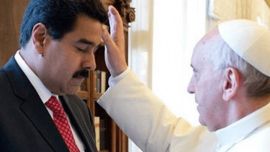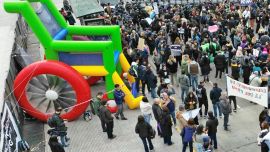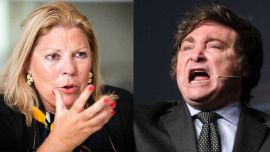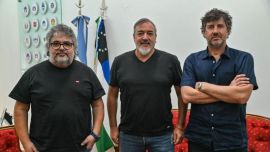Victims of alleged sexual and emotional abuse at the hands of priests and educators at the Instituto Antonio Próvolo in Mendoza may finally find justice Monday.
After nearly three months of gruelling closed-door testimony, plaintiff lawyers from the Mendoza-based human rights organisation Xumek asked Tuesday for the maximum sentence possible under Argentina’s current penal code for those in the dock.
If judges agree, that could see sentences of 50 years in jail for 61-year-old Argentine Horacio Corbacho, and up to 15 years for Nicola Corradi, an 83-year-old Italian priest who ran the institute, and the site’s former gardener Armando Gómez, 50.
Collectively, they are accused of rape, sexual abuse, the corruption of children and mistreatment at a Catholic school for deaf children.
In total, the priests face a total of 28 charges. Victims total around 20 minors.
A fourth person was charged, 57-year-old administrator Jorge Bordón. He agreed to a plea deal just over a year ago, trading an acknowledgment he’d participated in at least 11 acts of abuse for a shorter trial and a 10-year sentence.
Though trials started in August, the wait for victims and their families has been much longer. The first victims came forward in 2016, leading to the prompt arrest of Corradi, but according to Sergio Salinas, one of the plaintiff’s attorneys, the abuse dates back at least to the previous decade.
“And that’s just what we know about,” Salinas remarked. “What else has happened?”
Corradi came to Mendoza from La Plata in 1998 to assume leadership of the school for deaf children. He originally moved to Argentina from the Antonio Próvolo institute in Verona, Italy, another school racked by a sexual abuse scandal during his time there.
COMMITMENT
The offices of Xumek sit on a busy street corner in Mendoza City, a 10-minute walk from downtown’s main square. It’s a two-storey converted house that the non-profit starting sharing with another NGO last year in order to cut costs, explains Bianca Cecchini, communications manager.
Xumek is a volunteer organisation, staffed by full-time students or professionals who do this work as a labour of love. Cecchini, for example, studies social communication, and she started at Xumek as an intern before being promoted to her current role. Estefanía Araya runs point on migrant issues, but she travels from Junín, making the long hour-long drive by car every day.
On a hot, early summer day, giant windows are swung wide open to let in a slight breeze. The office’s shelves are lined with stacks of case files, binders full of background briefings and the occasional bag of yerba mate to fuel the long hours. The WiFi cuts in and out, and the staff members swap laptop power cords to find one that works.
The group was founded in 2006 by a handful of lawyers and academics who found themselves perpetually preoccupied by the human rights situation in Mendoza, but the group’s grassroots mobilisation – for causes like indigenous rights, improved prison conditions and women’s rights – started in 2001. Xumek maintains that gritty, scrappy aura a decade on without feeling inauthentic. Even the name — which means “sun” in the language of the indigenous Huarpe people who inhabited the province where Mendoza now sits — animates the staff and reminds them of their “important commitment” to the province’s vulnerable and marginalised, says Cecchini.
Lucas Lecour and Salinas, the respective president and vice-president of Xumek, hustle as hard as the rest. The two lawyers make up part of the victim’s legal team in the Próvolo case, as well as being partners at their own law firm in Mendoza, Lavado Salinas Leour.
Together, the two represent most of the younger victims in the case, so they’re liaising with parents and family members and have witnessed firsthand the surprise and horror of relatives.
Oscar Barrella and Leonardo Lanci –who has called the case “the most important” of his 24 years as a lawyer – round out the legal team by representing more of the older victims. They interact more directly with survivors of the alleged abuse. Neither are from Xumek.
‘TERRIBLE PERVERSION’
A pivotal element of this case, and what makes it especially salient for a group like Xumek, is that the victims were handicapped. That disability was then exploited by the very people they were left in the care of at Próvolo.
As Salinas explains, a crucial point is the priests’ deliberate failure to teach the children how to communicate, thereby crippling them from being able to talk amongst one another about abuses or issue cohesive complaints to staff.
Argentina established a national sign language — the Argentine Sign Language (LSA) — that’s required by law to be taught in schools with specialised missions to teach and serve deaf children like Próvolo. However, students, including one of the case’s hallmark whistleblowers Ezequiel Villalonga, weren’t ever taught the language despite being at the school since childhood.
“If you don’t have language, you lose the ability to develop awareness and recognition of all these other experiences and behaviours,” Salinas told the Times. “It’s hard to have any concept of ideas such as your own physical wellbeing or of your sexuality.”
He describes the stories of abuse as “terrible perversions.” Victims testified they’d be hit by educators if they used LSA, and they endured frequent sexual encounters in the bathrooms. They also recounted stories of older students emulating abusive behaviours of teachers and priests and younger kids demonstrating symptoms of trauma through self-exposure, violence or even incontinence.
According to Salinas, stories like these are evidence for the corruption of minor charges that the plaintiff team has levied against the accused.
‘THEY SENT ME PACKING’
This case joins the growing list of abuse scandals that have plagued the Catholic Church, which today is led by Argentine pontiff Pope Francis.
Beyond platitudes from archbishops, the local branch of the Church has remained largely quiet on the Próvolo case, in keeping with its tepid response to the larger global scandal.
In July 2017, Pope Francis appointed Monsignor Alberto Bochatey, the auxiliary bishop for La Plata, as the Apostolic Commissioner to look into the Company of Mary, the group that runs the Próvolo institutes. Bochatey said that despite requests for “forgiveness” from the victims, “they sent [him] packing.”
Salinas has little sympathy for the Church. He said it helped hide the victimisation of these deaf children for years, and that many of the religious members who have touched the Próvolo case in some capacity have failed their responsibilities to students, families and the public.
Despite his belief there’s broad evidence of a cover-up aided by institutions like the Church and the State, Salinas maintains his faith in the judicial system.
“We said everything we could. And it was very moving,” he said.
The verdict and sentences will be announced from Criminal Court No. 2 of Mendoza, led by judges Carlos Díaz, Aníbal Crivelli, and Mauricio Juan, on Monday.
The question of reparations remains outstanding and is being handled through a separate judicial process that won’t be addressed Monday.


























Comments